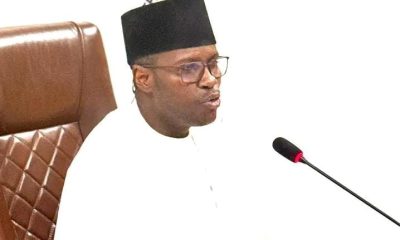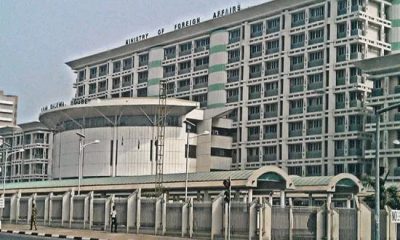National
NIGERIAN GOVERNORS’ LEGACY OF PAIN: UNEMPLOYED YOUTHS IN SHACKLES AND ECONOMIC ASPHYXIATION

By Comr. Preye Tambou
13th April, 2025
The story of Nigeria’s youth is one of unfulfilled potential, dashed hopes, and economic despair. With over 53% of its youth population unemployed, Nigeria’s future looks bleak. State governors, entrusted with the responsibility of creating an enabling environment for economic growth and job creation, have failed miserably.
As the National President of SWUYN, I am compelled to express the frustrations and desperation of millions of unemployed Nigerian youths and the stark reality that State Governors are the major contributors to the poverty, hardship, and youth unemployment crisis in their States and Nigeria at large.
The stark reality of Nigeria’s socio-economic challenges is evident in the faces of bitterness and anger that dot the streets of our States. From the North to the South, East to the West, poverty, starvation, unemployment, and government neglect have taken a toll on the populace.
The struggles of underemployed youths and small business owners are palpable, with poor electricity supply, lack of portable water, increase electricity tariffs, and darkness hindering their progress. Joblessness has forced graduates into unconventional livelihoods, such as gateman/security, conductors, (tricycle) keke drivers, okada riders, POS operators, street vendors, hawkers and labourers. These jobs are often seen as a last resort for graduates who are struggling to find employment in their chosen fields.
The rise of social vices like ritual killings, street beggars, cultism, prostitution, and robbery is a direct consequence of poverty, hardship, and unemployment. The increase in crime rates is a symptom of the failure of State governors to provide jobs and economic opportunities for their citizens.
The situation demands urgent attention and action from leaders to address these pressing issues and provide a better future for Nigerians.
It is an affront to the struggles of the masses to honour Governors with awards for good governance and excellence when many Nigerians are grappling with poverty, unemployment, and underdevelopment. What are they truly celebrating? Is it their ability to mask their failures with eloquent speeches and superficial achievements?
Nigeria’s unemployment crisis has its roots in the country’s post-independence economic trajectory. Key factors contributing to this issue include the Post-Civil War Economic Shifts where the end of the Nigerian Civil War in 1970 marked a significant shift in the country’s economy, with a focus on oil production that led to neglect of other sectors, the Economic Downturns where the Structural Adjustment Programmes (SAP) of the 1980s led to massive layoffs and economic instability, the Lack of lndustrialization where the failure to develop a robust industrial base caused limited job opportunities, and the Rapid Population Growth has outpaced job creation, exacerbating unemployment.
While the situation varies across states, some examples include Lagos State, once a hub for industrial activity, has seen a decline in manufacturing jobs occurred due to economic challenges and infrastructure issues; Rivers State, which has struggled with high unemployment rates despite being an oil-producing state due to lack of economic diversification; and Kaduna State, where insecurity and lack of investment in key sectors have hindered economic growth.
The plight of unemployed youths in Nigeria is a pressing issue that demands attention from State governors. According to the National Bureau of Statistics, Nigeria’s national unemployment rate stood at 4.3% in the second quarter of 2024, translating to approximately 9.87 million unemployed Nigerians while youths unemployment rate stood at 6.5% but this figure does not reveal the full picture. Breakdown of unemployment rates in some states, Highest Unemployment Rates include Abia State 18.7%, FCT 14.1%, Rivers State 13.4%, and the Lowest Unemployment Rates are Borno State 7.3%, Kano 7.6%, Nasarawa 0.5%, Sokoto 1.2%, Benue 1.6%, Kebbi 1.6%, Taraba 1.9% (2023 data)
South-South Region: Delta State has an unemployment rate of 11.5% and 8.2%, while Bayelsa State has a rate of 13.5% and 6.3%. South-East Region: Enugu State has an unemployment rate of 6.5% and 5.9%, while Anambra State has a rate of 8.4% and 4.8%. North-Central Region: Kogi State has an unemployment rate of 12.4% and 3%, while Kwara State has a rate of 10.9% and 4.8%. (2023 data).
Many young Nigerians are underemployed or trapped in insecure, low-productivity jobs in the informal sector. The International Labour Organization notes that this reflects the desperation of youths who can’t afford to remain unemployed and economically dependent on parents or guardians.
State Governors have a constitutional responsibility to create an enabling environment for economic growth and job creation. Unfortunately, many have fallen short of this expectation. They have prioritized grandiose projects that line the pockets of their cronies over investing in human capital development, infrastructure, and entrepreneurship. This misplaced priority has led to lack of job-creating initiatives.
Research and interactions with various stakeholders have revealed that most State governments lack concrete plans to address unemployment, failing to provide vocational training to equip youths with skills that can make them employable or self-reliant support, lacks support for entrepreneurship to offer necessary resources, mentorship, and funding for start-ups and small businesses and has limited investment in infrastructure to develop basic infrastructure that can attract investments and spur economic growth.
The absence of economic opportunities has stifled growth, leading to increased economic asphyxiation, that is, poverty, inflation, and a collapsing currency. While governors preoccupy themselves with ego-boosting projects and misplaced priorities, the youth bulge in Nigeria remains unemployed and restless. This is evident in the numerous protests and agitations across the country.
The consequences of this failure are far-reaching from brain drain to social unrest where over 70% of Nigerian youths want to leave the country permanently, reflecting a deep loss of faith in leadership and frustrated youths are increasingly restless, leading to social agitations and protests.
The frustration is palpable. Nigerians are indeed known for their resilience, resourcefulness, and determination. However, the State government’s failure to provide basic necessities, job opportunities, and a conducive environment for growth has made life unbearable for many.
The disconnect between the State government’s actions and the people’s needs is stark. While Nigerians strive to make ends meet, State governors seem out of touch, prioritizing grandiose projects over the welfare of their citizens.
It is time for a change. The government must prioritize the people’s needs, create opportunities for growth, and ensure that Nigerians can live with dignity. The people’s endurance will only last for so long; it is time for tangible action.
State Governors must reorient governance to prioritize job creation, entrepreneurship, and human capital development. This includes investing in Youth Development by providing vocational training, mentorship, and funding for start-ups, Fostering an Enabling Environment by developing infrastructure, promoting ease of doing business, and ensuring security.
Until Nigerian governors take concrete steps to address these issues, the legacy of pain, unemployed youths in shackles, and economic asphyxiation will continue to define their tenure. SWUYN will continue to engage with stakeholders, including government officials and private sectors, to find lasting solutions to this pressing issue. The time for action is now.













